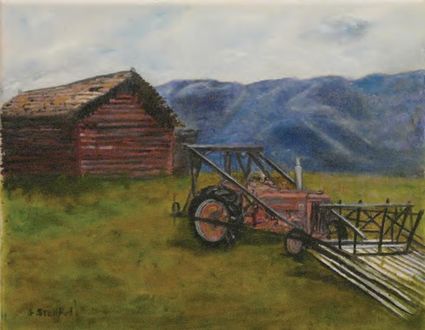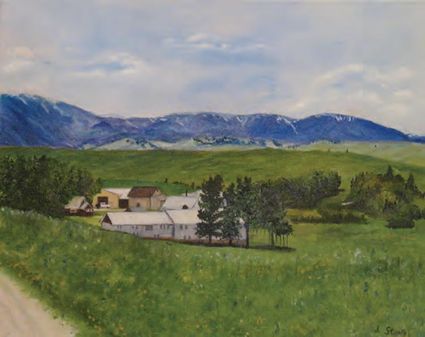The Variable Fortunes of Ranching
Ellis Cattle Company and Ballard Ranch
March 4, 2020
Do you know any cattle ranch tales that begin with a ship disaster? No? Just read on.
When the gold rush was on, Alvin A. Ellis and his wife, Lynthia, traveled from Ohio to California to join in the search. Whether they struck it rich is not known, but their devious route back to Ohio made them passengers on a sidewheel steamer named the "Central America." It was known as the ship of gold and operated between Central America and the east coast of the United States.
Aptly designated, it carried 30,000 pounds of the precious metal and was bound for New York City in September, 1857 when it was ravaged by a hurricane off the Carolinas and sank on the 12th of that month. The 153 survivors of the 578 passengers and crew were mainly women and children, and Mr. Ellis went down with the cargo, some of it possibly his own. Nothing is known about the Ellis' share of the $8,000,000 of gold, but imagine yourself a passenger with a fortune stored below decks while the ocean washes over them to carry you to certain death. Not twenty times your riches would purchase you another second of life. What an excruciating punishment!
The loss of what now is worth $550,000,000 weakened public confidence in our economy and reportedly contributed to the Panic of 1857. The recovery of the gold in 1988 spawned another wave of excitement, arrests, and legal battles over ownership of the hoard.
To support her three children, Lynthia opened a boarding house in Ohio. Later, her two sons, Charles and Alvin, Jr. worked their way west – of course – on railroads and by dabbling in cattle, which they bought from settlers heading to California and sold to the Union Pacific to feed its construction crews.
In Oregon they bought 1600 head and trailed them to Montana, where Alvin, Jr. survived the winter by shooting buffalo and selling the hides. In the summer they sold the herd to the Northern Pacific, returned to Oregon, and drove new cattle back to Montana.
In 1883 Alvin brought back a special, extra someone and built this wife a home in Billings. The next year he became a charter member of the Montana Stockgrowers, which was formed to stop cattle rustlers.
Granville Stuart, known as "Mr. Montana," was originally a "Mr. Virginia," that went west, of course, as a pioneer, prospector, businessman, vigilante, author, and cattleman. In 1884 he became leader of "Stuart's Stranglers," vigilantes that killed that year twenty or more horse and cattle thieves and, some said, quite a few more of undetermined affiliation. Reportedly, Alvin rode with Stuart's group.
With that threat suppressed, he homesteaded the land recognized today as the Ellis Cattle Company, but neither was that without overcoming serious obstacles. When it came to homesteads, as witnessed previously in our little histories, the federal government could both giveth and taketh away. In this case it tooketh away, gaveth back to the Crows, and asked him to pay for his usage of it. For once, it appeared the Indians were not getting the short end of the stick, but the government reconsidered and tooketh and gaveth again. It decreased the size of the reservation, and he was again permitted to homestead that land. Thus, the Indians did, in fact, receive their usual short end of the stick.
Mr. Ellis began as a horse rancher, but many of his herd of 5000 died of kidney failure from eating rotten old grass corrupted by a fungus. This was a man accustomed to adversity, however, and he recovered by switching to raising cattle, which perhaps either had sense enough to avoid bad grass or the horses had consumed it all.
Then, his marriage dissolved, but just as resourcefully in that failure he switched to a new wife, Mattie Turttle, who gave him five children before dying in the birth of the last. Mr. Ellis, himself, passed away at age 87 in 1942.
At the time of our introduction Alvin Ellis IV, an avid skier at Red Lodge, operated the ranch with his sons and grandsons. With all the adversity conquered in the creation and developing of this enterprise, a good deal of pride in it is justified and a measure of insolence and arrogance, tolerable, in the ones that did the work, anyway.
In 1943, the year following Alvin Ellis Jr.'s demise, Ann Ballard's grandfather bought the ranch which is now hers, a short distance from the Ellises. Picturesquely placed with the backdrop of a mountain range, the old farm house was nestled under stately trees among scattered equipment and out-buildings. It was as if time had stopped there. Frolicking around the structure was one of Ann's horses, desperately wanting to be petted, fed a treat, and taken for a ride. Nearby was an old rusting car parked in the tall grass. The wind whispering through those giant trees along with the sandhill cranes singing all around, made us feel as if we were standing in another era.
Lee Yeats, the original owner, or perhaps Ann's grandpa could easily come out of that log garage and start up the old tractor with the hay loader attached to put in a good day's work. However, the pretty little place was not bustling as it once had been, and Ms. Ballard supplemented her agricultural income by driving a school bus.
In every profession or calling, some members, despite apparently equal talents and industry, fair less well than others. "The breaks of the game," or some such explanation is how we rationalize the variation in success measures. What we've noticed about Montana ranchers, though, is that most don't see fit to lament bad breaks or to congratulate themselves for good fortune; they continue to work hard and do their best. That, after all, should be our rules for living.








Reader Comments(0)